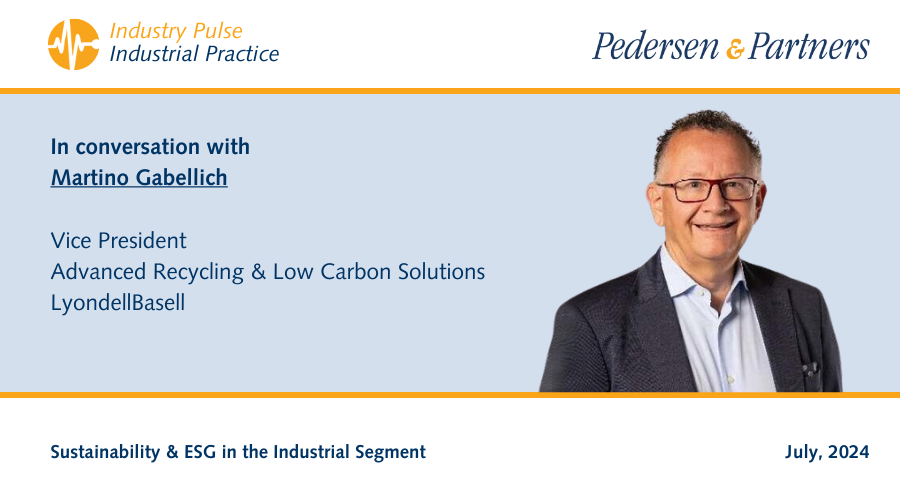Industry Pulse - Sustainability & ESG in the Industrial Segment: In conversation with Martino Gabellich, Vice President Advanced Recycling and Low Carbon Solutions at LyondellBasell
By Julia Casoli, Client Partner, and Sune Christiansen, Partner and Global Head of the Industrial Practice Group, Pedersen & Partners:
As part of our ongoing "Industry Pulse" series, the Industrial Practice Group at Pedersen & Partners recently hosted a Guest Speaker session with Martino Gabellich. Martino shared his extensive knowledge and the latest advancements in recycling technologies, particularly focusing on the complementary roles of mechanical and chemical recycling in fostering a sustainable future.
Martino Gabellich is VP, Advanced Recycling and Low Carbon Solutions at LyondellBasell and is responsible on a global basis for the development and oversight of the company’s strategy and business initiatives in this space. His focus is on new ventures, partnerships, and a fast-growing portfolio of investments and new technologies. He is also a member of the company’s team focused on investments in Venture Capital funds.
Julia: Dear Martino, you have covered various roles in your career in Sales & Marketing, Business Management, New Business Development, R&D, Strategy, and M&A.
You have also worked across six different countries on 3 continents. I think your expertise in the chemical industry and circularity solutions could be very inspiring for our team and network.
Can you share with us your view on the transition of the chemical industry towards circularity? Which technologies are striving? Who are the trailblazers? What are the challenges? What are the implications related to Talent and Leadership?
Martino: The chemical industry is undergoing a significant transition from a linear to a circular economy. This shift is crucial for integrating plastic waste back into the production cycle. We see both mechanical and chemical recycling playing vital roles in this transition. Mechanical recycling involves physically processing plastic waste into new materials, while chemical recycling breaks down plastics into their original feedstock. These methods address different recycling needs, with chemical recycling being particularly effective for plastics that are difficult to recycle mechanically.
Sune: Could you elaborate on the advancements in recycling technologies and how they are contributing to this transition?
Martino: LyondellBasell has been making investments in venture capital funds and partnering with innovative companies to leverage new technologies and products that support our sustainability goals. We are also developing in-house a molecular recycling technology called MoReTec. This technology aims to scale up the recycling of large volumes of plastics waste, thereby helping to enable a circular economy and preventing plastic waste from ending up in landfills, incineration or the environment.
Julia: It's fascinating to hear about these technological advancements. What about the consumers? How are consumer preferences influencing your sustainability initiatives?
Martino: We observe a growing consumer preference for sustainable products, combined with the development of regulatory requirements and brand owners' ambitions. We aim to scale innovative recycling technologies globally to meet the demands of customers and consumers for sustainable solutions. We are redefining our industry by developing circular and low carbon products and technologies at scale and championing chemistry as a sustainable solution for our planet.
Achieving these ambitions requires strong leadership skills, particularly in partnership, entrepreneurship, and empowerment. Fostering strong partnerships across industries and sectors is crucial for driving collective progress. Entrepreneurship is key to pioneering innovative solutions and taking bold steps towards sustainability goals. Finally, empowerment ensures that teams and individuals are motivated and equipped to contribute effectively to initiatives.
Julia: Thank you, Martino. Your insights on the top three leadership skills for a sustainable future: partnership, entrepreneurship and empowerment, are invaluable. How do these skills play out in your current role and within LyondellBasell?
Martino: In my role, these skills are integral to driving our sustainability agenda. We work closely with various stakeholders to forge strong partnerships, encourage entrepreneurial thinking within our teams to innovate and develop new solutions and empower our employees to take ownership and drive sustainability initiatives forward. This holistic approach is essential for making meaningful progress towards our goals.
Sune: Speaking about the progress, we noted that LyondellBasell has set some ambitious sustainability targets. Could you share more about how you plan to achieve the goals?
Martino: Absolutely. At LyondellBasell, we are committed to advancing and innovating sustainable solutions profitably. Our goals include producing over 2 million tonnes of recycled and renewable-based polymers annually by 2030*, achieving net zero scope 1 and 2 greenhouse gas emissions from our global operations by 2050, and reducing scope 1, 2, and 3 greenhouse gas emissions by 2030. We also work to ensure that 50% of our electricity is procured from renewable sources by 2030. Additionally, we are focused on eliminating plastic pellet loss to the environment from our facilities and ensuring zero incidents, injuries, and accidents. We are also very active promoting DEI within the company, and we aim for example to achieve gender parity in global senior leadership by 2032. These ambitious targets demonstrate our commitment to sustainability and our role as an industry leader in driving positive change.
Julia: Dear Martino, thank you for your time and valuable insights. It was a pleasure having you with us.
*Production and marketing include (i) joint venture production marketed by LYB plus our pro rata share of the remaining production produced and marketed by the joint venture and (ii) production via third-party tolling arrangements.

